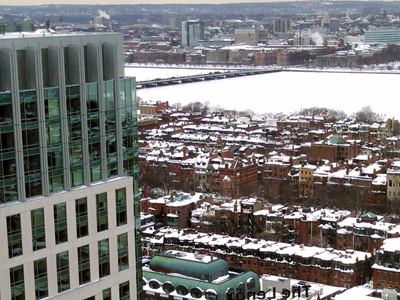My Experience at the 2015 Richard Tapia Conference

By Lauren Gaber, AccessComputing Team Member
I received a scholarship from AccessComputing to attend the 2015 ACM Richard Tapia Celebration of Diversity in Computing in Boston, Massachusetts that took place on February 18 – 21. This year’s conference theme was diversity at scale, which focused on “celebrating efforts to move diversity in all aspects of computing beyond conversation and study into full practice and implementation.”
This was my first big computing conference, and the first time I have flown alone. Though I was nervous at first, I gained confidence in being able to be independent. I was psyched to attend workshops on resumes, graduate school, and networking, and by putting myself out there, I learned to be more comfortable in walking up to strangers and striking up a conversation. Being open to new things and putting my regular fears on hold for a while really let me get the most out of the conference and meet a variety of new people.
Before the opening presentation, I met with students from Grinnell, Virginia Tech, and Purdue, and felt very welcomed. The Fireside Chat went very well, and I had the opportunity to meet with the some of the speakers, including David Martinez and Bill Kindred from MIT Lincoln Laboratory, who recommended a book called “Smart Machines,” by John Kelly.
I spent a lot of time at the career fair meeting as many representatives as possible to learn about my different options for school and careers. There were local schools as well as big name recruiters like IBM and Google. I gained a ton of fantastic resources and learned about a lot of opportunities, including scholarships to graduate school. I even got an interview for an intern position in a national lab!
There were also some really great talks, panels, and speeches. My two favorite plenary speakers were Chad Jenkins, who gave a talk on robotics titled “Robotics to Reach Out and Change the World,” and Shaun Kane, who gave a talk on accessibility technology entitled “Superhuman Computing: Designing Custom Software and Hardware Interfaces to Support Our Natural Abilities.” My favorite panels were the “When Working for Diversity in CS Becomes Your Day Job” and “Disability: Celebrating a Face of Diversity.” The first panel shared interesting stories about working for inclusion, and I learned some very effective techniques Harvey Mudd College implemented to get more women and girls involved in computing careers.
The disability session was the best opportunity I’d had thus far to make myself aware of the other people from AccessComputing. One thing we discussed was the term “disabled,” and the negative connotations behind it; this made me think a lot about how I identify myself—something I’m still figuring out. The session seemed short, but I was glad to meet and talk with so many great people. I really think representation matters, and the experience instilled in me a real pride and sense of belonging in the professional computing community.
Overall, this conference was very inspiring and informative. I learned about fields in computing that I wasn’t aware of before or just didn’t have comprehensive access to at my own institution, such as library science, human-computer interaction, security, ethics and privacy, cloud computing, and machine learning. The experience also made me set a list of future goals, including staying in contact with my network; investigating the University of Michigan Ann Arbor’s 3D printing lab; and getting more professionals with disabilities involved in advocacy and networking.